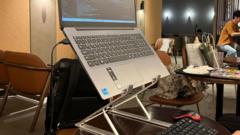**Cafes in South Korea are grappling with a cultural phenomenon as students set up prolonged study sessions, prompting new guidelines and varied policies from establishments looking to strike a balance.**
**South Korean Cafes Take Action Against Prolonged Studying Habits**

**South Korean Cafes Take Action Against Prolonged Studying Habits**
**Efforts to Balance Cafe Atmosphere and Student Work Habits Emerge in Seoul**
In the bustling neighborhood of Daechi, South Korea, café owner Hyun Sung-joo faces a growing dilemma: balancing the needs of students and professionals who occupy his space for lengthy periods. Known as Cagongjok, this trend predominantly involves young South Koreans who transform coffee shops into makeshift study areas, often to the detriment of other patrons. A recent incident at Hyun's café saw a customer spreading out with two laptops and an elaborate six-port power strip for a full day's work, leading him to take the unusual step of blocking power outlets.
Starbucks Korea has acknowledged the surge in such practices, recently warning that while most customers use facilities respectfully, some go further by bringing in bulky equipment or leaving tables unattended. Implementing nationwide guidelines, the company aims to manage the disruptive behaviors without forcibly ejecting customers, marking a significant shift toward establishing a more accommodating environment.
Despite the new rules, moderate studiers haven’t been significantly deterred from utilizing cafes for long hours. An 18-year-old preparing for the competitive university entrance exam, "Suneung," revealed she spends nearly 11 hours at Starbucks, often leaving personal belongings unattended while she takes breaks. The challenge of maintaining a comfortable atmosphere amidst this growing trend has drawn mixed responses from customers; many appreciate the need for change, while others view it as an overreach of authority.
Independently owned cafes are also struggling with this issue, implementing their own measures. While Hyun welcomes considerate Cagongjok patrons who occasionally order extra drinks, others, like cafe owner Kim in Jeonju, have enforced a “No Study Zone” policy due to complaints about space monopolization by study groups. This policy limits study sessions to two hours, while still allowing regular customers to enjoy their coffee in peace.
The phenomenon has roots deep within South Korea’s competitive society, as articulated by academic Choi Ra-young, who emphasizes a systemic lack of public spaces for students and job seekers. Cagongjok serves as a reflection of societal pressures faced by youth, who often prefer cafes over libraries or homes due to comfort or familiarity. As this trend evolves, the call for creating inclusive spaces for studying—without disturbing other customers—remains vital for the future of South Korean cafés.
Starbucks Korea has acknowledged the surge in such practices, recently warning that while most customers use facilities respectfully, some go further by bringing in bulky equipment or leaving tables unattended. Implementing nationwide guidelines, the company aims to manage the disruptive behaviors without forcibly ejecting customers, marking a significant shift toward establishing a more accommodating environment.
Despite the new rules, moderate studiers haven’t been significantly deterred from utilizing cafes for long hours. An 18-year-old preparing for the competitive university entrance exam, "Suneung," revealed she spends nearly 11 hours at Starbucks, often leaving personal belongings unattended while she takes breaks. The challenge of maintaining a comfortable atmosphere amidst this growing trend has drawn mixed responses from customers; many appreciate the need for change, while others view it as an overreach of authority.
Independently owned cafes are also struggling with this issue, implementing their own measures. While Hyun welcomes considerate Cagongjok patrons who occasionally order extra drinks, others, like cafe owner Kim in Jeonju, have enforced a “No Study Zone” policy due to complaints about space monopolization by study groups. This policy limits study sessions to two hours, while still allowing regular customers to enjoy their coffee in peace.
The phenomenon has roots deep within South Korea’s competitive society, as articulated by academic Choi Ra-young, who emphasizes a systemic lack of public spaces for students and job seekers. Cagongjok serves as a reflection of societal pressures faced by youth, who often prefer cafes over libraries or homes due to comfort or familiarity. As this trend evolves, the call for creating inclusive spaces for studying—without disturbing other customers—remains vital for the future of South Korean cafés.


















